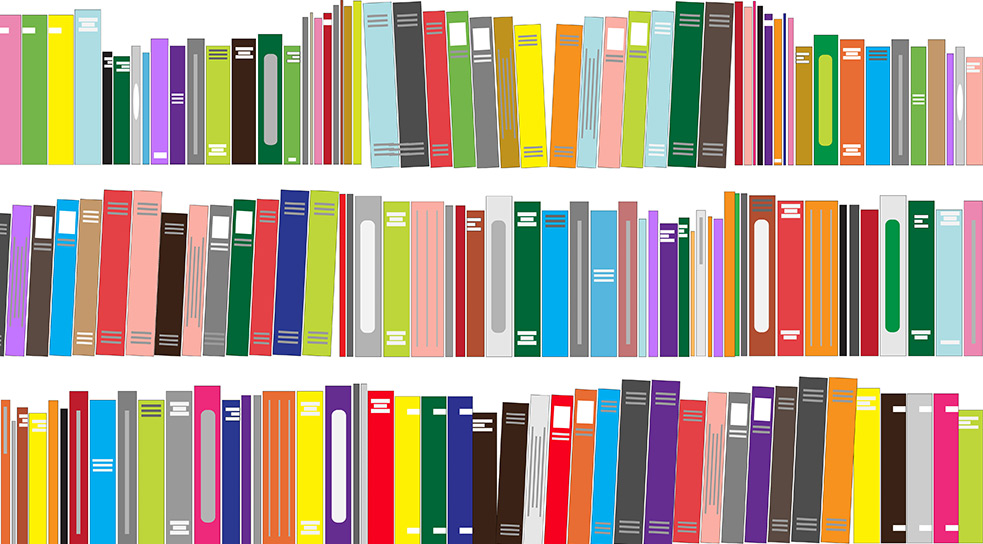 Summer: the season for cracking open a good book under the shade of a tree. Below, we’ve compiled about 70 stellar book recommendations from members of the TED community. Warning: not all of these books can be classified as beach reads. And we think that is a good thing.
Summer: the season for cracking open a good book under the shade of a tree. Below, we’ve compiled about 70 stellar book recommendations from members of the TED community. Warning: not all of these books can be classified as beach reads. And we think that is a good thing.
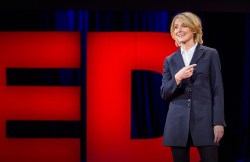 Picks from Elizabeth Gilbert, author
Picks from Elizabeth Gilbert, author
The Principles of Uncertainty by Maira Kalman. “The only book I have ever bought by the crate-load. I give copies of this sumptuous masterpiece to everyone I care about. I could try to describe it further, but … it would be more efficient if you just read it yourself. (Watch Maira Kalman’s TED Talk, “The illustrated woman.”)
Age of Wonder: The Romantic Generation and the Discovery of the Beauty and Terror in Science by Richard Holmes. “I just finished writing a novel about 18th- and 19th-century scientific exploration, and this engaging book was a real touchstone for me during my research. It’s a thrilling portrait of the greatest scientists of the romantic era. Action-adventure science! It makes you want to buy a microscope, build a balloon, discover a planet…”
What Are You Optimistic About? by John Brockman. “In a world of grim news, this book is a beacon of light. Brockman asked more than 150 big thinkers to each write a short essay on what they authentically feel good about in the world, looking into the future. It is not always easy to find optimism that is also intelligent, but this book has it. It will make you feel better, trust me.”
Meditations by Marcus Aurelius. “ I find something incredibly soothing about the notion of a 2nd-century Roman emperor worrying about the same stuff I worry about—namely, how are we to be? What makes a good person? What is honor? How do we endure disappointment? How do we find peace within chaos? He does not necessarily always have he answers, but the stubbornness of these eternal inquiries always calms me down.”
Mixing Minds: The Power of Relationship in Psychoanalysis and Buddhism by Pilar Jennings. “Jennings is both a psychotherapist and a Buddhist practitioner. As someone with one foot in both camps, she writes intelligently about the merits and pitfalls of both Western psychiatry and Eastern philosophy—unthreading both paths with remarkable intelligence and perspective. Good stuff for seekers of all stripes.”
Refusing Heaven by Jack Gilbert. “Jack Gilbert (no relation to me, sadly) was a beautiful man and a mighty poet who could have been one of the great literary rock stars of our age—except that he didn’t care a bit about fame, fortune, or reputation. This collection is his grand, twilight-of-life rumination on passion, beauty and mortality. It includes a line that I strive daily to live by: ‘We must have the stubbornness to accept our gladness in the ruthless furnace of this world.’ ”
Hyperbole and a Half: Unfortunate Situations, Flawed Coping Mechanisms, Mayhem, and Other Things That Happened by Allie Brosh. “Any book that could make me laugh like a maniac, all alone in an empty hotel room at 2 in the morning (while suffering jetlag and the flu), is worth putting on this list. This is stupendous entertainment. Don’t be totally fooled by the goofy hilarity, though; these pages also contain a serious mediation on depression and resilience.”
Want Not by Jonathan Miles. “TED alumni Dave Eggers thought this was one of the best novels of 2013, and I agree completely. Miles has written a staggeringly powerful story about the relationship between contemporary Americans and their post-consumer garbage. There is not a preachy word in here, but it’s a life-changing narrative, nonetheless.
The Rings of Saturn by W.G. Sebald. “The late Sebald’s writing was some kind of gorgeous combination of elegy, poetry, contemplation, fiction, diary. Nobody in the world ever wrote, or thought, or even felt quite like him. Every word is important, compassionate and resonant—like notes played on a distant cello. We lost this author too soon; he was one of the great ones.”
Invisible Cities by Italo Calvino. “This unusual book is a series of fictional conversations between Kublai Khan and Marco Polo. Each page brings a new description of an imagined city within the Great Khan’s empire—as described by Marco Polo. It is a magical, delightful, outrageously inventive. Just fall into these pages and let your imagination do the rest.”
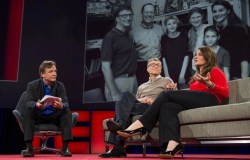
Picks from Melinda Gates, philanthropist
The Last Hunger Season: A Year in an African Farm Community on the Brink of Change by Roger Thurow. “Roger Thurow movingly chronicles the lives of four Kenyan farmers as they struggle to support their families through the wanjala, Swahili for ‘hunger season.’ It’s about the importance of investing in Africa’s smallholder farmers and a compelling blueprint for doing it effectively.”
However Long the Night: Molly Melching’s Journey to Help Millions of African Women and Girls Triumph by Aimee Molloy. “For more than 40 years, Molly Melching has worked in Senegalese communities to help improve lives. Her success is based on her insistence on working in close partnership with local communities … This book reinforced my own belief that developing communities already have the potential and desire to spark the change that will lead to better lives for themselves and their families.”
In the Company of the Poor: Conversations with Dr. Paul Farmer and Fr. Gustavo Gutierrez by Paul Farmer. “Paul Farmer is longtime friend of mine, and through these pages, you can hear his voice and feel his deep personal connection to improving lives for people who are too often ignored.”
Change by Design: How Design Thinking Transforms Organizations and Inspires Innovation by Tim Brown. “Design thinking is a model of problem solving that could have huge implications for global health and development. It’s an approach that recognizes that the people facing challenges have the best understanding of what solutions will work for them. So many of the women and families I meet have the potential to lift themselves out of poverty. Design thinking reminds us that to unlock this opportunity, we have to first enlist their help.” (Watch Tim Brown’s TED Talk, “Tales of creativity and play.”)
Mighty Be Our Powers: How Sisterhood, Prayer, and Sex Changed a Nation at War by Leymah Gbowee. “Leymah Gbowee became a global figure when she won a Nobel Prize for launching a grassroots women’s movement that led to peace in Liberia. This is an incredible tale of a group of women coming together to change the course of a country’s history—it’s also the inspiring story of how Leymah overcame her own doubts and fears and found the courage to lead them.” (Watch Leymah Gbowee’s TED Talk, “Unlock the intelligence, passion, greatness of girls.”)
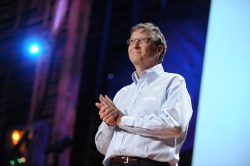 Picks from Bill Gates, technologist and philanthropist
Picks from Bill Gates, technologist and philanthropist
The Better Angels of Our Nature: Why Violence Has Declined by Steven Pinker. “Steven Pinker’s carefully researched study stands out as one of the most important books I’ve ever read. Pinker paints a remarkable picture showing that the world has evolved over time to be a far less violent place than before. It offers a fresh perspective on how to achieve positive outcomes in the world.” (Watch Steven Pinker’s TED Talk on this topic, “The surprising decline in violence.”)
Getting Better: Why Global Development Is Succeeding—and How We Can Improve the World Even More by Charles Kenny. “I know from personal experience that stepping into the public square to announce that foreign aid is important and effective can be lonely work. Charles Kenny’s elegant book on the impact of aid carefully documents how the quality of life—even in the world’s poorest countries—has improved dramatically over the past several decades with reams of solid data to support his case.”
Behind the Beautiful Forevers: Life, Death and Hope in a Mumbai Undercity by Katherine Boo. “Katherine Boo spent three years getting to know the people of Annawadi, a slum of about 3,000 people on the edge of a sewage-filled lake in India’s largest city. Her book is a poignant reminder of how much more work needs to be done to address the inequities in the world. But it’s also an uplifting story of people striving to make a life for themselves.”
The Man Who Fed the World by Leon Hesser. “Norman Borlaug is one of my heroes, and Leon Hesser’s biography is a fascinating account of Borlaug’s life and accomplishments. This is a story of genius, self-sacrifice, and determination. Borlaug was a remarkable scientist and humanitarian whose work in agriculture is rightfully credited with saving the lives of over a billion people.”
Energy Myths and Realities: Bringing Science to the Energy Policy Debate by Vaclav Smil. “Vaclav Smil is probably my favorite living author. If you care about energy issues, I recommend this volume, though its unvarnished look at the realities of energy use and infrastructure may be disconcerting to anyone who thinks solving our energy problems will be easy. Smil provides important lessons to keep in mind if we’re to avert the looming climate crisis.”
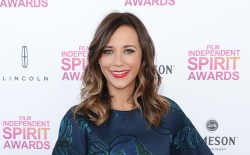 Picks from Rashida Jones, actor and writer
Picks from Rashida Jones, actor and writer
Me Talk Pretty One Day by David Sedaris. “Just…laugh out loud funny. If you ever think comedy is only best as a visual medium, read his chapter on nouvelle cuisine.”
Freedom by Jonathan Franzen. “My favorite modern novel. The detail and imagination in which Franzen writes about so many different characters’ psyches is mind-blowing.”
The Writer’s Journey: Mythic Structure for Writers by Christopher Vogler. “My go-to book for story structure. Anytime I start writing, I start here. I re-visit here. I end here. It’s perfect.”
Bird by Bird: Some Instructions on Writing and Life by Anne Lamott. “Anne Lamott makes the inevitably difficult, complex process of writing feel a little bit more buoyant and joyful. THAT is inspiring.”
The Giving Tree by Shel Silverstein. “There are no words for this book. Expect perfect and true. I’ve loved it my whole life. I cry when I think about it now.”
One Hundred Years of Solitude by Gabriel García Márquez. “If ever I feel like too many characters or too much plot is impossible to make work, I look at this beautiful, epic novel.”
The Power of Myth by Joseph Campbell. “This book is always good. Especially when you need to get big-picture on a project. Big, universal themes that are undeniable and infinite and astutely observed.”
Yoga Sutra of Patanjali. “Sometimes, I need to connect to something bigger than me. To remember that anything good that comes to me is really from somewhere else that I can’t actually take any credit for. The Yoga Sutras humble me and remind me of this.”
Lolita by Vladimir Nabokov. “The most exquisite writing you can find. I read this just to remember what the Holy Grail of writing looks and feels like.”
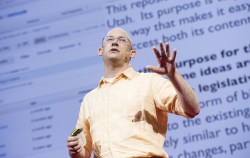
Picks from Clay Shirky, social media theorist
It’s Complicated: The Social Lives of Networked Teens by danah boyd. “danah boyd is one of the first scholars to be both an expert on youth and online environments, and to have been a youth in those environments herself. This inside/outside perspective comes through on every page of It’s Complicated, a keenly observed and deeply felt look at the things adolescents do and don’t understand about their media use.”
Social Physics: How Good Ideas Spread—The Lessons from New Science by Alex Pentland. “Pentland has done more to demystifying human behavior in the wild than anyone else in the last decade. Social Physics describes his studies of individual and group behavior, gleaned from data ranging from cell phone tracking to reading entire databases of online action. One key finding: humans are better off if we’re connected, but not too connected.”
Smarter Than You Think: How Technology Is Changing Our Minds for the Better by Clive Thompson. “Smarter Than You Think takes the John Henry story—man vs. machine—and adds a third option: people and machines working together. As Thompson documents, a wide range of problems—from chess playing to learning languages—are better tackled by human-computer hybrids.”
Everything Is Obvious (Once You Know the Answer): How Common Sense Fails Us by Duncan J. Watts. “Watts revolutionized the study of networks by describing the Small Worlds network pattern, where large networks of anything—cells, computers, people—tend to be clusters of clusters of clusters, connected by a only a few nodes. In Everything Is Obvious, he looks at a key effect of this pattern: the viral spread of any idea passes through so many random links that even a perfect understanding of the past does not equip us to predict the future.”
Now I Know Who My Comrades Are: Voices from the Internet Underground by Emily Parker. “Parker reports from China, Russia and Cuba on the effects of internet use on political consciousness. Through a series of portraits and observations, she describes how the attitudes that often accompany internet use can alter the psychology of the user, including especially the powerful realization: ‘I am not alone.’”
Why It’s Still Kicking Off Everywhere: The New Global Revolutions by Paul Mason. “Three years ago—before Mubarak stepped down, before anyone #Occupied anything—Mason wrote ’20 Reasons It’s Kicking Off Everywhere,’a series of prescient observations in essay form that helps explain everything from Spain’s Indignados to Russia’s Pussy Riot to Turkey’s Gezi Park uprising to the Walmart protests in the United States. In this expanded and updated book, Mason lays out much of the background to the global protest movements; the chapter ‘Nobody Saw It Coming’ alone is worth the price of admission.”
Counter-Democracy: Politics in an Age of Distrust by Pierre Rosanvallon. “One of the two best books explaining the deep structure of the current wave of protests, even though it was published before they started. (The other is Domination and the Arts of Resistance, below.) It rescues the hidden history of democracy, documenting all the ways that the citizens’ power to observe, limit or reject government action become part of the democratic repertoire before the right to vote, and looks at the way that coalitions of the unwilling shape national landscapes.”
Domination and the Arts of Resistance: Hidden Transcripts by James C. Scott. “Also written well before the Sidi Bouzid uprising in Tunisia, Scott lays out the ways that even populations that seem to be under the total dominance of an oppressor find ways to discuss their discontent with the status quo, often in a kind of coded protest. Revolutionary moments are marked by the sudden appearance of the long-lived but long-hidden transcript into the public sphere.”
Beautiful Trouble: A Toolbox for Revolution by Andrew Boyd. ”Unlike the other books I’ve chosen, this is a reference work. It is a pattern language for 21st-century protests, a linked documentation of the tactics, principles, theories, case studies, and practitioners—Banner Hang, Ethical Spectacle, the Yes Men— that make up much of the current repertoire of insurgent political action.”
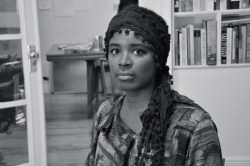
Picks from Uzoamaka Maduka, founder of The American Reader
First as Tragedy, Then as Farce by Slavoj Žižek. “Slavoj Žižek is regularly, and hysterically, misunderstood by his critics. Read this carefully and seriously, and you will leave with a new, radically informed understanding of our present political, economic and cultural crises, and exactly what must be done to survive them. In this book, Žižek puts all of Western culture and politics on the psychoanalyst’s couch, and what he finds is incredible.”
The Mark of the Sacred by Jean-Pierre Dupuy. “By a pioneer of cognitive science and one of the leading philosophers of science and technology today, this is an incisive and critical survey of recent developments in those fields. It asks the provocative question, ‘Is secular reason separable from religion?’”
The Woman Destroyed by Simone de Beauvoir. “This is by no means an easy book; in fact it is a fairly devastating portrait of three women seen as their lives unspool, and a painful primer on the social costs of being a satisfied woman. Still, though it seems like a major downer, I read it with passion and pleasure, and it is the sort of advice a woman needs but seldom gets—or gets too late.”
Primitive Mentor by Dean Young. “Dean Young is one of the best poets America has produced, and this collection is a masterpiece. It’s also appropriately titled: this collection accompanies you as would a soulmate through the more primitive and compelling dimensions of the human soul.”
The Woman in the Dunes by Kobo Abe. “Mystery, suspense, and a vast pit of sand.”
Leaving the Sea: Stories by Ben Marcus. “Ben Marcus is the contemporary American master of the short story. His latest collection contains rare, gem-like fables that are at once disquieting and luminous. You do not know the possibilities, oddities and mysteries of our American language until you experience it in fiction of this caliber and ambition.”
You Are Not a Gadget: A Manifesto by Jaron Lanier. “A smart corrective to our digital optimism. Mr. Lanier shows us how and why we make ourselves stupider in order to make technology seem smarter.”
Wise Blood: A Novel by Flannery O’Connor. “Someone else has described it best: ‘Focused on the story of Hazel Motes, a 22-year-old caught in an unending struggle against his innate, desperate fate, this tale of redemption, retribution, false prophets, blindness, blindings and wisdoms gives us one of the most riveting characters in 20th-century American fiction.’”
Seize the Day by Saul Bellow. “A struggle between father and son doubles as an unyielding and brilliant portrayal of American optimism, speculation, and desire. This is a classic of American literature written by one of the giants of our tradition.”
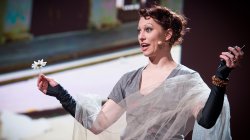
Picks from Amanda Palmer, musician
The Gift: Creativity and the Artist in the Modern World by Lewis Hyde. “Lewis Hyde wrote this incredible history of human gift exchanges back in the early 1980s. Starting with our misunderstanding of the term “Indian giver,” he opens up treasure troves of myths, religious rituals and other long-standing exchanges that go far beyond money. He schools hard about how the act of making art, and the art we make, is a gift that must stay in motion in order to function and serve humanity. It’s just beautiful.”
Dropping Ashes on the Buddha by Seung Sahn. “I read this on my first trip to Australia, where I was taking a crack at street performing for the Adelaide Festival. This was the first book that really drove home the Buddhist philosophy that I try to adhere to. It’s a series of fantastic (and sometimes funny) letters written from Seung Sahn, a Korean Zen master who founded the Cambridge Zen Center, to his students.”
Moonwalking with Einstein: The Art and Science of Remembering Everything by Joshua Foer. “I started losing my memory a few summers ago—I mean, REALLY LOSING IT. I couldn’t remember one night what a CHERRY was called. I waltzed into the local bookstore and asked if they had any books on memory, so I could maybe get a grasp on what the hell was happening to me. Somehow this book landed in my hands. It changed the way I thought about memory, the mind and thinking, and I’ve since gifted this book to at least a dozen people.” (Watch Foer’s TED Talk, “Feats of memory anyone can do.”)
A Collaboration with Nature by Andy Goldsworthy. “This is a book of art made from nature that you cannot help but fall in love with. I found it on a coffee table at my friend Jason Webley’s house and I couldn’t help but to stop everything I was doing and pore over the pages. The process that this guy uses to create his works will wrestle your soul open—it’s just immaculate.”
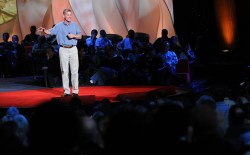
Picks from Stanley McChrystal, military leader
Bully Pulpit: Theodore Roosevelt, William Howard Taft and the Golden Age of Journalism by Doris Kearns Goodwin. “One of my favorite books from last year, this is an examination of leadership during a period of significant change and challenge in our nation’s history. It reveals the relationship between Roosevelt and Taft—and their influence on each other’s thinking and perspectives. It’s an insightful examination of senior decision-making. (Watch Doris Kearns Goodwin’s TED Talk, “Lessons from past presidents.”)
American Icon: Alan Mulally and the Fight to Save Ford Motor Company by Bryce G. Hoffman. “Leadership under crisis and adapting to change are themes that make this book relevant for anybody who is responsible for stewarding an organization that is steeped with history but challenged by new developments.”
My Promised Land: The Triumph and Tragedy of Israel by Ari Shavit. “A deeply personal account of patriotism and national identity, and an examination of how a country’s citizenry sometimes struggles to balance heritage and tradition with modernity and the contemporary.”
Five Days at Memorial: Life and Death in a Storm-Ravaged Hospital by Sheri Fink. “A powerful window into collective decision-making during crisis, and an illustration of how individuals and organizations face dilemmas where there seems to be no good outcome.”
Lean In: Women, Work, and the Will to Lead by Sheryl Sandberg. “Written by a new friend, this book is an important reminder that the very best organizations always set the conditions for personal success, where each of us can accomplish and contribute the very best of ourselves.” (Watch Sheryl Sandberg’s TED Talk, “So we leaned in … now what?”)
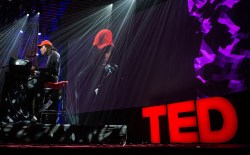
Picks from Blood Orange, musician
Formalized Music: Thought and Mathematics in Composition by Iannis Xenakis. “After fleeing Greece during World War II, Xenakis became an illegal immigrant in Paris. He got a job as an engineer and architect. From there, his interest in music sprung and he applied the techniques of architecture to his musical compositions. With breakthrough scores shattering any preconceived notion about music and its links to math, this book is a prime collection of theories and techniques from one of the greatest avant-garde composers to have ever been.”
The Philosopher’s Touch: Sartre, Nietzsche and Barthes at the Piano by François Noudelmann. “Noudelmann writes in-depth about these three philosophers, and draws links between their piano playing and their theories and writing. I find it especially interesting how their taste in regards to what they said they listened to differed from what they actually enjoyed playing themselves. Everyone has guilty pleasures!”
Yayoi Kusama: Infinity Mirror Room by Jo Applin. “Yayoi Kusama’s Infinity Mirror Room was an artistic success in the ’60s when it first shook the art world, and again with her most recent exhibition in New York City in 2013. Kusama, whose work deals with the repetition and the comfort within that, has her work expertly chronicled and analyzed in this book.”
Image-Music-Text by Roland Barthes. “Simply put, it’s three essays from the renowned philosopher, including the classic ‘Death of an Author,’ dealing with the ongoing question of separating the art from its author.”
Last Night on Earth by Bill T. Jones. “The biography of Florida-born, New York-adopted choreographer/director/composer Bill T. Jones. Who, along with his troupe the Bill T. Jones/Arnie Zane Dance Company, revolutionized the dance world as well as theatre itself in the ’70s and ’80s, culminating in his masterpiece, the musical Fela!”
Feelings Are Facts: A Life by Yvonne Rainer. “A biography of the San Francisco choreographer and poet. It gives insight to her groundbreaking piece, ‘Trio A (1966).’”
Studies in Counterpoint: Based on the Twelve-Tone Technique by Ernst Krenek. “Ernst Krenek laid the groundwork for modern atonality—music without a key or center—and paved the way for artists like John Cage after him.”
White Girls by Hilton Als. “Critic/writer Hilton Als has written one of the best books on race and gender I have ever read—it’s part biography, part essay. This book will change your perception regardless of where you stood beforehand.”
Monster in a Box by Spalding Gray. “A game-changing monologist, Spalding Gray is an inspiration to me. He told stories of his own life as an actor living in New York with brutal honesty, confidence and an abundance of neurotic attitude. In this meta-monologue, he talks about trying to write his first fiction book, which actually was about his life, and the many things he did to avoid writing it. For extended reading, you can seek out the novel itself, Impossible Vacation.”
Trench Town Rock (Lost Roads Series; No 40) by Kamau Brathwaite. “Recommended by my friend, writer Jenna Sauers, this truly incredible book bounces along in a language that sounds like a song you’ve never heard before, yet needed to listen to all along. It’s poetry as well as African studies. Brathwaite takes you on such a jarring journey from the first page that it is almost impossible to put this book down.”

At every TED, we have a bookstore. The reading list above contains all the books guest-curators picked for the store at TED2014. Want even more book recommendations? Check out the TED Bookstore recommendations from 2013 »
Photo credits: Book image, iStockphoto; TED stage shots, James Duncan Davidson; Rashida Jones image, Thinkstock; Uzoamaka Maduka image, courtesy of Uzoamaka Maduka; TED Bookstore image, Ryan Lash.
Comments (44)